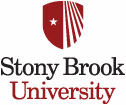
Syllabus
Place and time: TuTh 12:30pm-1:50pm in Math Tower 5-127.
Instructor: Leon Takhtajan, Office: Math Tower 5-111.
Office hours: W, 2:00pm-4:00pm in 5-111 and by appointment.
Course description: The course is an introduction to the theory of complex manifolds, aimed at students interested in complex/algebraic geometry and mathematical physics. Presentation of the general theory will be illustrated by applications to concrete examples.Specifically, we plan to cover the following topics.
- Review of holomorphic functions of several complex variables.
- Review of complex and Hermitian linear algebra.
- Definition and examples of complex manifolds.
- Differential forms on a complex manifold.
- Sheaves, Cech cohomology and Dolbeault cohomology.
- Holomorphic vector and line bundles.
- The Hodge theorem.
- Kahler manifolds, Kahler identities.
- Hodge decomposition.
- Applications: the Kodaira vanishing and Kodaira embedding theorems.
- Coherent sheaves and Grauert's theorem.
Textbook: There will be no assigned textbooks, though I will basically follow Principles of Algebraic Geometry by Phillip Griffiths and Joseph Harris (see Aleksey Zinger list of errors/typos in this classic text), and excellent lecture notes by Christian Schnell. Additional sources include
- Differential Analysis on Complex Manifolds by Raymond O. Wells.
- Complex Geometry by Daniel Huybrechts.
- Introduction to Complex Manifolds by John M. Lee.
Grading: The grade in the course will be determined by class participation and homework. There will be few homework assignments, posted once or twice per month, testing the basic concepts and examples. The assignments should be submitted by the due date in the pdf format (using latex).
Homework:
- Homework set 1 due on September 25. Homework 1 solutions.
- Homework set 2 due on October 21. Homework 2 solution sketches. The tex file can help typesetting solutions in latex.
-
Homework
set
3 due on November 19. Homework
3 solution sketches. The
tex file can help
typesetting solutions in latex.
University Policies Disability support services. If you have a physical, psychological, medical or learning disability that may impact your course work, please contact Disability Support Services, 128 ECC Building (631) 632-6748. They will determine with you what accommodations are necessary and appropriate. All information and documentation is confidential. Arrangements should be made early in the semester (before the first exam) so that your needs can be accommodated. All information and documentation of disability is confidential. Students who require assistance during emergency evacuation are encouraged to discuss their needs with their professors and Disability Support Services.
Academic integrity. Each student must pursue his or her academic goals honestly and be personally accountable for all submitted work. Representing another person's work as your own is always wrong. Faculty is required to report any suspected instances of academic dishonesty to the Academic Judiciary. Faculty in the Health Sciences Center (School of Health Technology & Management, Nursing, Social Welfare, Dental Medicine) and School of Medicine are required to follow their school-specific procedures. For more comprehensive information on academic integrity, including categories of academic dishonesty please refer to the academic judiciary website.
Critical incident management. Stony Brook University expects students to respect the rights, privileges, and property of other people. Faculty are required to report to the Office of University Community Standards any disruptive behavior that interrupts their ability to teach, compromises the safety of the learning environment, or inhibits students' ability to learn. Faculty in the HSC Schools and the School of Medicine are required to follow their school-specific procedures. Further information about most academic matters can be found in the Undergraduate Bulletin, the Undergraduate Class Schedule, and the Faculty-Employee Handbook.
Last updated August 2025